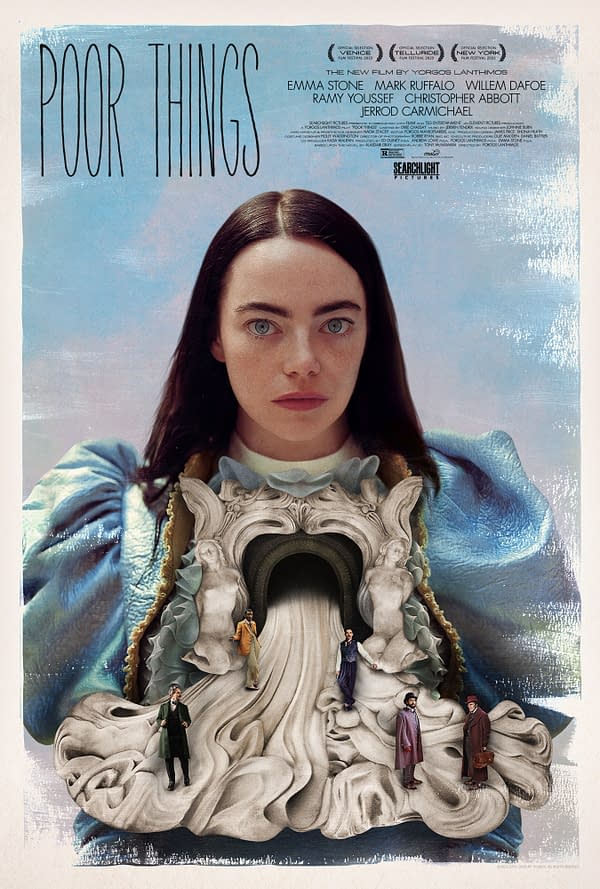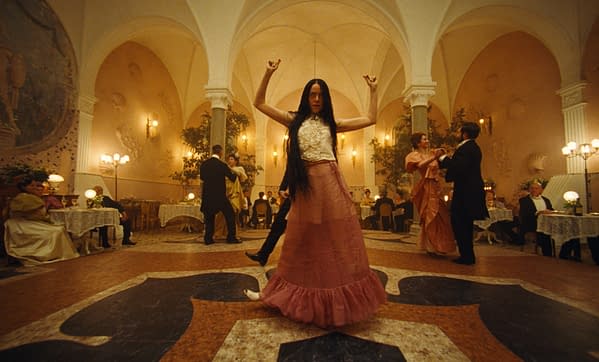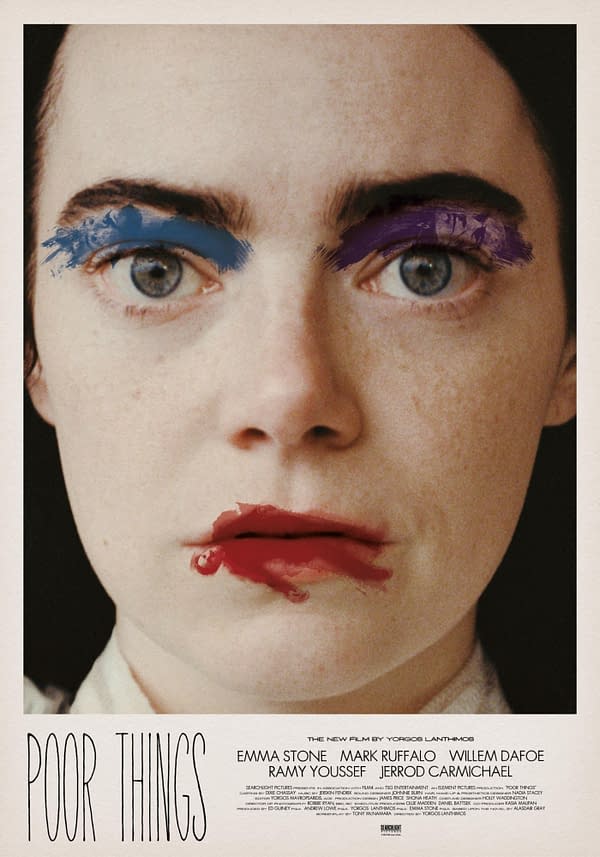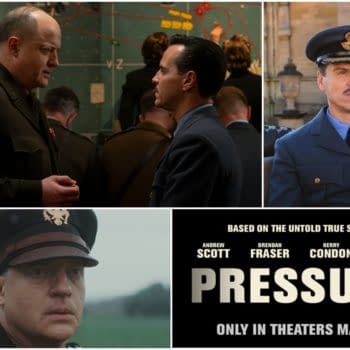Posted in: Kaitlyn Booth, Movies, Searchlight | Tagged: emma stone, poor things, Yorgos Lanthimos
Poor Things Review: Discovering Humanity Through Carnal Desires
To reduce Poor Things to nothing more than another debate about whether or not sex "belongs" in film is doing a great disservice to one of the best films of the year.
Article Summary
- 'Poor Things' explores humanity and identity through sex in a unique setting.
- Emma Stone delivers a notable performance without a conventional framework.
- Yorgos Lanthimos directs, creating an aesthetically fresh and distinct world.
- The film poses deep ethical questions, extending beyond its sexual content.
Poor Things is a twisted, beautiful tale of a woman trying to find herself and discover her own humanity through carnal desires.
Director: Yorgos Lanthimos
Summary: The incredible tale about the fantastical evolution of Bella Baxter; a young woman brought back to life by the brilliant and unorthodox scientist, Dr. Godwin Baxter.

What is it that makes us human, and what is it that makes us into the people we are today? The basic concept of Poor Things is likely going to be something that will turn a lot of people off. The idea of a twisted version of Frankenstein where one of the main ways the woman who is brought back to life discovers her new identity and life is through sex. However, for a film with a lot of sex in it, Poor Things is a film that isn't sexy at all.
The sex we see Bella having and how she experiences it has less to do with connection through emotion but almost entirely physical. It's almost mechanical to her that she wants pleasure, so why not seek someone who is willing to let her have it? While the men around her look at Bella as an object of sex, Bella doesn't seem to see the world around her in the same way.

The world in question, as shown by director Yorgos Lanthimos and cinematographer Robbie Ryan, is nothing short of stunning. It's hard to make a world feel unique these days, but everything about Poor Things looks like something we haven't seen before. While we might have seen pieces of it before, such as the costumes looking like something that could exist in the real world or moments looking very steampunk, you don't need entirely new pieces to create something new. That is what Poor Things does so brilliantly; even the pieces of the world that are clearly inspired by other places are put together in such a way it feels like something we've never seen before.
While Bella is exploring her humanity primarily through sex, it isn't the only thing that she experiences, and as she sees more and more of the world, we see her view on sex change. Bella is a woman without any of the baggage of patriarchy on her in every sense of the word. Not only does she have no shame in terms of her own body and what her "place" in the world is supposed to be in this world, but she also has no concept of complex answers to even more complex questions. Those people are hungry; why can't we just feed them? I don't like this food; why would I keep eating it? That crying baby is annoying me, I'm going to make it stop crying by means possible. It's a fascinating look at what a person coming into this world without any societal knowledge would do if they were thrown into the deep end.
That is probably the thing that makes Emma Stone's performance in Poor Things so impressive because there is no frame of reference for how someone like Bella would act. It's almost impossible to wrap our heads around and that is where the comedy of the film comes from. You laugh when Bella says she is going to punch a crying baby because you cannot picture an actual person doing that. It means that Stone had no frame of reference when it came to building Bella. The script was there, but she spoke about the physical aspects of the character. Bella walks differently as the movie goes on; she moves differently as she begins to see more of the world and discovers the good and the bad.

Stone is backed up by a fantastic supporting cast. Mark Ruffalo could not come across as more of a scummy man who sees Bella as nothing more than a beautiful woman that he could manipulate and do whatever he wants with. It's interesting to watch the power dynamic between the two of them because you think you know what it's going to be, but it becomes quite clear that Bella is a force of nature in many different ways. Willem Dafoe as the good doctor who brings Bella back from the dead without a care in the world for the moral or ethical implications of what he is doing, is always fun to watch. Ramy Youssef is on hand in a rather thankless role and starts as an assistant to Dafoe's Dr. Baxter but soon becomes one of the only men in Bella's life who doesn't look at her like a thing.
Poor Things isn't going to be a film for everyone and people have been having a discourse about it from the moment it premiered at the Toronto Film Festival. However, everyone seems to be talking about the sex in the film instead of grappling with the moral and ethical questions the film is raising about not only the very existence of Bella but societal niceties and how that baggage keeps us from experiencing life to its fullest. Sex is part of Poor Things, but women are often judged on how they approach sex, how much they have, with whom, and even if they enjoy it. To reduce this film to nothing more than another debate about whether or not sex "belongs" in film is doing a great disservice to one of the best films of the year.


















